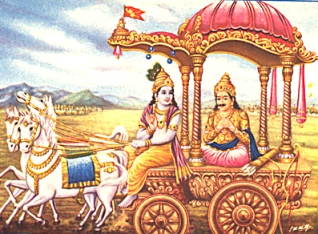
Bhagavad Geetha

The Bhagavad Geetha is a celestial song rendered by Lord Krishna to the warrior Arjuna in the battlefield of Kurukshetra. Although the Bhagavad Geetha as we know is a part of the great epic Mahabharata, there is no doubt that the principles and teachings of the Geetha are ancient. In the first three slokas of the fourth chapter, reference is made to the Lord instructing Geetha to Surya first and later to Manu and to the fact that from Manu it reached Iksvaku and thence to others in succession. So the Geetha is beyond the category of time and it cannot be assigned to a particular point of time, past or present.
The Bhagavad Geetha is the "milk" of the Upanishads,
"drawn" by the cowherd Krishna with the help of the "calf" Arjuna, for
all mankind to drink and draw sustenance from. It is a text book for
all mankind giving the secrets of spiritual science in clear and simple
terms. The Geetha is a text for spiritual practitioners, for it
emphasizes Sadhana and spiritual attitudes more than anything
else. Every chapter lays down means and methods of reaching the goal of
peace and harmony. Geetha is a boat, which can take man across from the
self-imposed state of bondage to the freedom, which is his nature. But
it will be useful only when the reader has as much detachment as Arjuna
had when Krishna started the discourse.
If you have as much Vishada as Arjuna had, you have the Adhikara to get the teaching, which removed the Vishada. The Geetha will act on the mental system only when the symptoms of Vishada are strong. Arjuna, the greatest bowman of those days, anxious since years to destroy the wicked Kauravas who had angered him by merciless and systematic vendetta, suddenly gets disinterested in everything that he thought precious until that moment. In short, his mind had become ripe for the illumination. He has the Lord Himself as Guru by his side and he knows it. He asks Him: "I am struggling in ignorance; I am confused; I do not know which is Dharma and which is Adharma." He seeks disciple-hood and lays himself at the Feet of Krishna in self-surrender! Anyone anywhere who reaches that stage of spiritual surrender will get the response from Krishna and He will teach the Githa from the chariot which is driven by Him, that is his own heart.
Really speaking, man has come into this Karmakshetra (field of activity) only to engage himself in activity, not in order to earn the fruit of such activity. That is the teaching of Geetha, its fundamental lesson. Arjuna, the great hero capable of great renunciation and of great wisdom is deluded by the awful needs of war and this grief handicaps his activity. He imposes on Atma (ever untouched by the characteristics of the moving changing world) the unreal and ephemeral nature of the world and takes this delusion as true. This is the tragedy not of Arjuna alone but of all humanity. Therefore the Geetha is of universal and eternal value. To study the Geetha is to learn the art of swimming across the sea of delusion. The Geetha is the very voice of Lord Krishna.
The way it begins and the way it ends gives the clue to the subject, which it expounds. The very first verse starts with the words, "Dharmakshethre Kurukshetre..", the word Dharma being the leading word. The last verse speaks of "Yathra Yogeshwarah Krishna" and this word "Yogeshwara" sums up the Dharma that is being taught. Thus it is clear that the objective of the teaching in the Geetha is just this: "Remember Dharma; practice Dharma". Bhagavad Geetha is a textbook of Dharma in all its aspects. It discusses all the principles underlying Dharma.
The Geetha, which begins with the Vishada Yoga, ends with Sanyasa Yoga; Vishada is the foundation and Sanyasa, the super structure. Vishada (despondency) is the seed and Sanyasa (liberation), the fruit.
Complete surrender to the Lord, freedom from the shackles, which bind one with the external world of objects, the observance of good deeds and virtuous disciplines, these are the principal truths underlined in the Geetha. The Lord holds forth these as the best form of training in the deepest secrets of inner progress. The Lord's command is that each should pursue the Dharma that is laid down for him; each person should plan his life according to the spiritual foundations of his culture; he should give up the 'objective' vision and listen to the Voice of God.
The Geetha is the greatest harmoniser of all Yogas. As a matter of fact, once the Geetha is made the guiding star of your life, the way you act will be Karma Yoga, tile way you feel be Bhakthi Yoga, the way you reason will be Jnana Yoga. It will become automatically so. What you do must be in line with Dharma; what you feel must foster Prema; what you think must reveal Sathyam. Then you will be blessed with Santhi, with even Prasanthi.
The Geethabhavanam (mansion of Geetha) is the mansion of Sathya and Dharma, erected for the benefit of the world. Study it with faith and devotion. Experience the curative and restorative effects of its teachings by actual practice. Understand the Geetha well and observing its injunctions establish yourselves in the attitude of Nishkaamakarma. Do all duties as acts of worship, Hari Prasadam. That is the sole task. Leave the rest to Him: the fruit, the consequence, the result. Then you receive the Grace of Hari and your life on earth is sanctified and becomes worthwhile.
-Bhagavan Baba
[Source: Geetha Vahini | Divine Discourse: 24 Jun 1961]